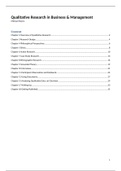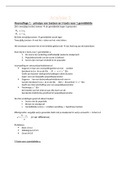Samenvatting
Summary Myers - Qualitative Research in Business and Management edition 3
- Instelling
- Radboud Universiteit Nijmegen (RU)
Summary of the book Qualitative Research in Business and Management (edition 3). Part of the course Kwalitatieve Onderzoeksmethodology / Qualitative Research.
[Meer zien]






